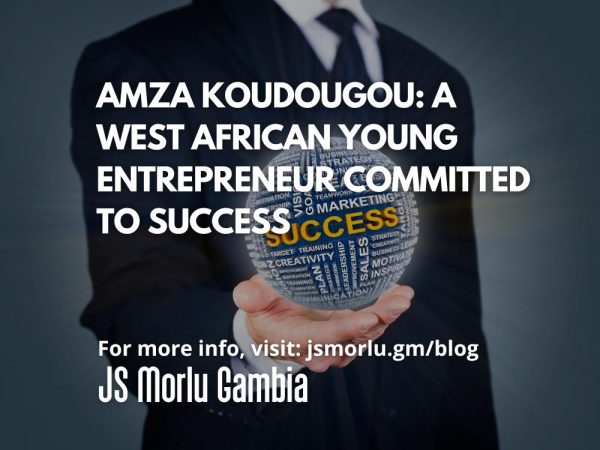Sub-Saharan Africa has a concentration of 60% – the largest proportion – of potential young entrepreneurs in the world. However, entrepreneurs are facing numerous constraints, mainly regarding access to loans, often because they do not have guarantees, sustainable business plans or projects that can be banked even with Microfinance Institutions (MFIs). What’s more, they are being expected to come up with “Eat the World” ideas, when most of them became entrepreneurs out of a strong economic necessity.
According to the Global Entrepreneurship Monitor/Youth Business International Report (2013), 32% of young men and women in Sub-Saharan African countries who start a private enterprise do so out of necessity, not out of a passion to innovate or thrive within a specific sector.

Young people at the Hackathon in Tenkodogo organised by Rikolto in June 2021
Amza KOUDOUGOU is one of those young entrepreneurs from West Africa. After taking several jobs involving precarious working conditions with informal companies specialising in electrical installations, his field of work, he decided to set up his own agrifood business. For him, entrepreneurship started as a way of subsistence and slowly became a means of using his creativity for the benefit of others.
“I had the idea of starting a poultry egg incubator manufacturing company because I realised that poultry farmers in my region use imported incubators which break down quickly and have to be replaced at great expense because few people know how to fix them,” says Amza.
In the Centre-Est region of Burkina Faso where he resides, livestock is the second-largest source of household income.
The region ranks fifth among 13 in Burkina Faso in terms of poultry farming, which is largely practised in a traditional way.
In this context, young people’s agrifood start-ups are increasing. However, the bankruptcy rate of these businesses is high for several reasons, including the short-lived novelty and competitiveness of the products or services offered.
To solve this problem, the Belgian Development Agency, Enabel, has initiated a programme to support the development of inclusive and sustainable entrepreneurship in the Centre-Est region of Burkina Faso.

“By granting this subsidy agreement, Enabel allows us to work together with the other organisations to find solutions to the challenges faced by young people, especially women and those living with physical disabilities, and also young people who are suffering from social and economic vulnerability when they want to start a business.”
The project started in March 2021, a fortunate period for Amza who, at that time, was already looking for technical and financial support to realise his idea.
“When I was told that I had been selected, I finally knew that my project idea could be develop. However, I have to give my all to move forward with the implementation.”
He was among the 150 young project idea bearers who took part in a hackathon which ended with a competition to select the best project ideas. 80 future entrepreneurs were selected. They participated in a training programme, together with 20 other already active entrepreneurs who had been selected on the basis of a call for proposals for business projects.
A total of 100 promoters attended the training and coaching programme developed as part of the incubation process.
Amza participated in several training sessions which included modules on accounting and financial management, marketing, market analysis, inclusive business model development (BMC), quality management, financial resources mobilisation, project development, financial education, awareness of decent work, public speaking and personal development. He also learned about entrepreneurship support funds, decentralised financial services in the region and their loan requirements.
“I learned from the session on personal development that, when you want to start something, you have to take the first steps and the support comes later,” says Amza.

In addition to these trainings, the young electrician was finally able – with the technical support of a coach with the project – to develop his business plan.
The quality of his plan and the arguments developed to defend his project idea during the pitching competition organised at the end of the training programme convinced the jury to select him among the 55 best promoters to benefit from a subsidy to fund their businesses.
“I have a solid business plan, there are now clearer options to obtain working capital”
However, he will only receive the subsidy if he mobilises a loan for his working capital with a decentralised financial service.

“We have a mechanism called the credit-backed subsidy. In the process, the mechanism is such that the promoter must first mobilise his/her working capital, before PACE-DID agrees to transfer the subsidy as investment funds.”
Amza was able to get a loan agreement for his working capital with Graine SARL, a financial service based in the region.
The project team confirmed his active participation in the whole incubation programme, including the business plan competition.
Amza also gave assurances about his ability to launch his business within three months of receiving the subsidised funds. The grant will enable him to acquire the essential equipment for the operation of the egg incubator workshop.

A total of 100 promoters attended the training and coaching programme developed as part of the incubation process.
Amza will not be alone in his business adventure. After the launch of his project, he will receive training in business management and digital marketing. He has asked for an opportunity to update his knowledge on solar panels. These sessions will allow the winning promoters to immediately apply the knowledge acquired to the management of their new companies in order to make the most out of them.
The winning promoters can also choose their mentors, and they will be supported by the PACE-DID team responsible for monitoring the implementation of the business projects.
“I feel reassured about the potential of my business. I hope to be able to transform my company into a training centre within 2 to 3 years. I would like to thank those who funded PACE-DID. This project provides us with invaluable support” confides Amza, smiling.
Original Source: Rikolto
